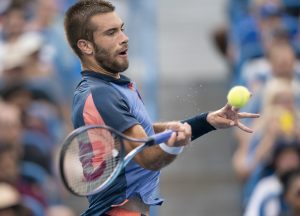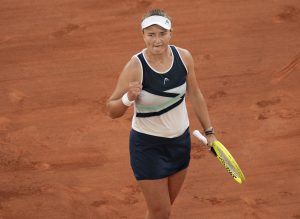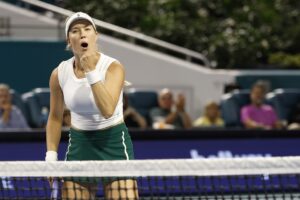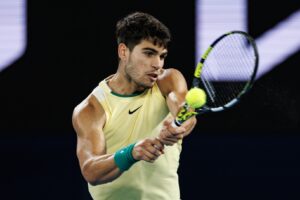An irritable and disgruntled Novak Djokovic sat prepared to answer the usual barrage of questions from a variety of media personnel following his quarter-final defeat at the 2018 French Open to the unseeded and then-relatively unknown Marco Cecchinato.
Asked about his aspirations for the upcoming grass-court season, Djokovic sharply declared that he “doesn’t know if (he is) going to play on the grass.” Asked to clarify his sentiment after a brief moment of silence as the media personnel gather their thoughts, the Serbian, again queried on his grass-court intentions, repeated, “I don’t know if I’m going to play on the grass.”
Recurring difficulties
The source of Djokovic’s frustration lies not solely within the disappointing loss to Cecchinato, but in large part because of the now two year drought since his last Grand Slam triumph, the 2016 French Open, and almost two years since his last Grand Slam final, the US Open that same year.
Recurring elbow soreness experienced throughout the 2016 and 2017 seasons prevented Djokovic from reaching the heights which saw him hold all four Grand Slam titles at the same time, a feat not achieved since the great Rod Laver lifted his second U.S Open trophy in 1969.
The elbow injury forced Djokovic to miss the final four months of the 2017 season, with the hope that an extended break would restore him to full health and fitness. However, upon returning for the Australian Open in January 2018, an event he has won a record-tying six times, the pain was still there.
The result? Another premature Grand Slam exit, this time to the rising South Korean star Hyeon Chung. Djokovic’s elbow began bothering him at the end of the first set of his straight sets loss, and despite taking a medical timeout, he experienced no relief.
Changes in coaching staff
Djokovic finally had a “small medical intervention” on his elbow on February 4, admitting he had been carrying the injury for the past two years. Evidently, the decision to delay the surgery in preference of natural healing irked his former coach Andre Agassi. Djokovic and Agassi parted ways in April of 2018, with the American noting that too often the pair found themselves agreeing to disagree, as Djokovic “wouldn’t listen” to Agassi’s advice, particularly on issues of a new conditioning and nutrition program.
Djokovic also ended his brief professional relationship with former player Radek Stepanek, who worked alongside Agassi, after less than six months.
The split proved beneficial for Djokovic, who, since returning from a one-month layoff in February 2018, lost his opening match in both Masters 1000 events in March, to Taro Daniel and Benoit Paire respectively, before splitting with Agassi.
Djokovic decided to reunite with his former coach, Marian Vajda, as well as Austrian fitness coach Gebhard Phil-Gritsch. Djokovic showed glimpses of his former self throughout the clay-court season, taking a set off clay-court specialist Dominic Thiem in Monte-Carlo, before reaching the semi-finals in Rome a month later, falling to eventual champion Rafael Nadal.
Djokovic’s game, albeit a shade of its former self, was beginning to resemble the impenetrable and imposing force it used to represent. The routine baseline rally balls which he so uncharacteristically miscued were more frequently finding their mark, the serving woes, particularly off the second delivery, were beginning to right themselves, and the fiery countenance etched across his face was beginning to return.
And so after an intense affair with Cecchinato in the French Open quarter final, in which Djokovic was visibly aggrieved with the rambunctious crowd, his body, his errant mistakes and the ever-rising level of his opponent’s play, Djokovic was angry.
Refusing to think about tennis, about his aspirations beyond the clay-court season, in particularly pertaining to the upcoming grass-court stint, Djokovic had little to say.
A return to excellence
But more than simply play the grass-court season, Djokovic dazzled, returning to his former self, and kick-starting a five-month stretch which would see him claim two Grand Slam titles, two Masters 1000 titles and earn the year-end #1 ranking in November 2018. Having posted a 14-8 record in the first half of the season, Djokovic would go 38-4 for the remainder of the schedule, and his angry press conference following the Cecchinato defeat represents somewhat of a turning point.
The point at which the tennis world knew that Djokovic was back near, if not at, his very best, was the enthralling Wimbledon semi-final matchup with Nadal, in which Djokovic triumphed 10-8 in the fifth set, a match carried over from the previous day as Kevin Anderson and John Isner battled to 26-24 in the fifth set.
Djokovic was commanding from the baseline, whipping his forehand to both corners of the court, and executing with perfection the renowned down-the-line backhand which has historically rattled his Spaniard counterpart. He served with confidence, his emotions were steadier than we’d seen for the best part of two years.
Nadal played perhaps his best ever match on a grass court, save for the 2008 mammoth Wimbledon final against Roger Federer. But yet Djokovic had too much for him, and 30 hours later, the Serb closed out a three-set victory over the exhausted Kevin Anderson to lift his 13th Grand Slam trophy.
A 14th would ensue at Flushing Meadows, a tournament this season characterized by its extreme temperatures and humidity – a battle of will as much as skill – as Djokovic, this time encountering a fresh and firing Juan Martin del Potro in the final, similarly dispatched his combatant in three sets.
And with Rafael Nadal’s near future uncertain as he battled a string of recurring injuries to round out the year, Djokovic stormed home in the world rankings, shielding off any threat of being overtaken by dispatching Roger Federer twice in as many attempts in the closing months of the season.
Losses in the finals of the last two tournaments of the year to next-generation stars Karen Khachanov and Alexander Zverev did not dent a spectacular five-month stretch from Djokovic, although it did ensure he remains one Masters 1000 title behind Rafael Nadal for the most all-time.
But Djokovic, just as his rivals Federer and Nadal did 18 months prior, returned from a surgery, or in Djokovic’s case a “minor medical intervention”, to win two Grand Slams and catapult himself to the top of the tennis world for the umpteenth time.
What an era we are witnessing.
Main Photo from Getty






